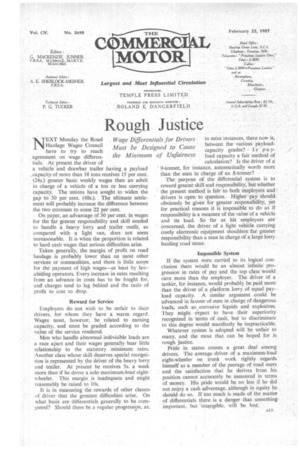Rough Justice
Page 23

If you've noticed an error in this article please click here to report it so we can fix it.
NEXT Monday the Road Haulage Wages Council have to try to reach . agreement on wage differentials. At present the driver of a vehicle and drawbar trailer having a payload _capacity of more than 18 tons receives 15 per cent. (24s.) greater basic weekly wages than an adult in charge of a vehicle of a ton or less carrying capacity. The unions have sought to widen the gap to 30 per cent. (48s.). The ultimate settlement will probably increase the difference between the two extremes to some 22 per cent.
On paper, an advantage of 30 per cent. in wages for the far greater responsibility and skill needed to handle a heavy lorry and trailer outfit, as compared with a light van, does not seem unreasonable. It is when the proportion is related to hard cash wages that serious difficulties arise.
Taken generally, the margin of profit on road haulage is probably lower than on most other services or commodities, and there is little scope for the payment of high wages—at least by lawabiding operators. Every increase in rates resulting from an advance in costs has to be fought for, and charges tend to lag behind and the ratio of profit to cost to drop.
Reward for Service Employers do not wish to be unfair to their drivers, toe whom they have a warm regard. Wages must, however, be related to earning capacity, and must be graded according to the value of the service rendered.
Men who handle abnormal indivisible loads are a race apart and their wages generally bear little relationship to the statutory minimum rates. Another class whose skill deserves special recognition is represented by the driver of the heavy lorry and trailer. At present he receives 5s. a week more than if he drove a solo maximum-load eightwheeler. This margin is inadequate and might reasonably be raised to 10s.
It is in measuring the rewards of other classes of driver that the greatest difficulties arise. On what basis are differentials generally to be computed? Should there be a regular progression, as. in most instances, there now is, between the various payloadcapacity grades? Is pa yload capacity a fair method of calculation? Is the driver of a 9-toriner, for instance, automatically worth more than the man in charge of an 8-tanner?
The purpose of the differential system is to reward greater skill and responsibility, but whether the present method is fair to both employers and. drivers is open to question. Higher pay should obviously be given for greater responsibility, yet for practical reasons it is impossible to do so if responsibility is a measure of the value of a vehicle and its load. So far as his employers are concerned, the driver of a light vehicle carrying costly electronic equipment shoulders far greater responsibility than a man in charge of a large lorry hauling road stone.
Impossible System If the system were carried to its logical conclusion there would be an almost infinite progression in rates of pay and the top class would earn more than the employer. The driver of a tanker, for instance, would probably be paid more than the driver of a platform lorry of equal payload capacity. A similar argument could be advanced in favour of men in charge of dangerous loads, such as corrosive liquids and explosives. They might expect to have their superiority recognized in terms of cash, but to discriminate to this degree would manifestly be impracticable.
Whatever system is adopted will be unfair to many, and the most that can be hoped for is rough justice.
Pride in status counts a great deal among drivers. The average driver of a maximum-load eight-wheeler on trunk work rightly regards himself as a member of the peerage of road users and the satisfaction that he derives from his position cannot accurately be measured in terms of money. His pride would be no less if he did not enjoy a cash advantage, although in equity he should do so. if too much is made of the matter of differentials there is a danger that something important, bet intangible, will be lost.
























































































